Deck 2: Solving Equations and Inequalities
Question
Question
Question
Question
Question
Question
Question
Question
Question
Question
Question
Question
Question
Question
Question
Question
Question
Question
Question
Question
Question
Question
Question
Question
Question
Question
Question
Question
Question
Question
Question
Question
Question
Question
Question
Question
Question
Question
Question
Question
Question
Question
Question
Question
Question
Question
Question
Question
Question
Question
Question
Question
Question
Question
Question
Question
Question
Question
Question
Question
Question
Question
Question
Question
Question
Question
Question
Question
Question
Question
Question
Question
Question
Question
Question
Question
Question
Question
Question
Question

Unlock Deck
Sign up to unlock the cards in this deck!
Unlock Deck
Unlock Deck
1/150
Play
Full screen (f)
Deck 2: Solving Equations and Inequalities
1
Solve the following equation. 
A)
B)
C)
D)
E)

A)

B)

C)

D)

E)


2
Set  and solve the resulting equation.
and solve the resulting equation. 
A)
B)
C)
D)
E)
 and solve the resulting equation.
and solve the resulting equation. 
A)

B)

C)

D)

E)


3
Solve: 
A)
B)
C)
D)
E)

A)

B)

C)

D)

E)


4
Simplify  and write the answer in standard form.
and write the answer in standard form.
A)
B)
C)
D) The expression cannot be simplified.
E)
 and write the answer in standard form.
and write the answer in standard form.A)

B)

C)

D) The expression cannot be simplified.
E)


Unlock Deck
Unlock for access to all 150 flashcards in this deck.
Unlock Deck
k this deck
5
Solve  using the quadratic formula.
using the quadratic formula.
A)
B)
C)
D)
E)
 using the quadratic formula.
using the quadratic formula.A)

B)

C)

D)

E)


Unlock Deck
Unlock for access to all 150 flashcards in this deck.
Unlock Deck
k this deck
6
Solve the following quadratic equation by factoring. 
A)
B)
C)
D)
E)

A)

B)

C)

D)

E)


Unlock Deck
Unlock for access to all 150 flashcards in this deck.
Unlock Deck
k this deck
7
Which of the following is a zero of the given function? 
 ,
,  '
'  ,
, 
A)
B)
C)
D)
E) none of these

 ,
,  '
'  ,
, 
A)

B)

C)

D)

E) none of these

Unlock Deck
Unlock for access to all 150 flashcards in this deck.
Unlock Deck
k this deck
8
Solve the following equation using any convenient method. 
A)
B)
C)
D)
E)

A)

B)

C)

D)

E)


Unlock Deck
Unlock for access to all 150 flashcards in this deck.
Unlock Deck
k this deck
9
Simplify  and write the answer in standard form.
and write the answer in standard form.
A) i
i
B) i
i
C) i
i
D) i
i
E) i
i
 and write the answer in standard form.
and write the answer in standard form.A)
 i
iB)
 i
iC)
 i
iD)
 i
iE)
 i
i
Unlock Deck
Unlock for access to all 150 flashcards in this deck.
Unlock Deck
k this deck
10
Simplify  and write the answer in standard form.
and write the answer in standard form.
A)
B)
C)
D)
E)
 and write the answer in standard form.
and write the answer in standard form.A)

B)

C)

D)

E)


Unlock Deck
Unlock for access to all 150 flashcards in this deck.
Unlock Deck
k this deck
11
Find the x-intercepts of the graph of the equation 
A)
B) ,
, 
C) ,
, 
D)
E) ,
, 

A)

B)
 ,
, 
C)
 ,
, 
D)

E)
 ,
, 

Unlock Deck
Unlock for access to all 150 flashcards in this deck.
Unlock Deck
k this deck
12
Which of the following is a zero of the given function? 
 ,
,  ,
,  ,
, 
A)
B)
C)
D)
E) none of these

 ,
,  ,
,  ,
, 
A)

B)

C)

D)

E) none of these

Unlock Deck
Unlock for access to all 150 flashcards in this deck.
Unlock Deck
k this deck
13
Solve  by factoring.
by factoring.
A)
B)
C)
D)
E)
 by factoring.
by factoring.A)

B)

C)

D)

E)


Unlock Deck
Unlock for access to all 150 flashcards in this deck.
Unlock Deck
k this deck
14
Determine any point(s) of intersection between the following equations. 
A)
B)
C)
D)
E)

A)

B)

C)

D)

E)


Unlock Deck
Unlock for access to all 150 flashcards in this deck.
Unlock Deck
k this deck
15
Solve the following equation. 
A)
B)
C)
D)
E)

A)

B)

C)

D)

E)


Unlock Deck
Unlock for access to all 150 flashcards in this deck.
Unlock Deck
k this deck
16
Find all solutions of the following equation algebraically. 
A)
B)
C)
D)
E)

A)

B)

C)

D)

E)


Unlock Deck
Unlock for access to all 150 flashcards in this deck.
Unlock Deck
k this deck
17
Find all solutions of the following equation algebraically. 
A)
B)
C)
D)
E)

A)

B)

C)

D)

E)


Unlock Deck
Unlock for access to all 150 flashcards in this deck.
Unlock Deck
k this deck
18
Find all solutions of  .
.
A)
B)
C)
D)
E)
 .
.A)

B)

C)

D)

E)


Unlock Deck
Unlock for access to all 150 flashcards in this deck.
Unlock Deck
k this deck
19
Solve: 
A)
B)
C)
D)
E)

A)

B)

C)

D)

E)


Unlock Deck
Unlock for access to all 150 flashcards in this deck.
Unlock Deck
k this deck
20
Solve: 
A) no solution
B)
C)
D)
E)

A) no solution
B)

C)

D)

E)


Unlock Deck
Unlock for access to all 150 flashcards in this deck.
Unlock Deck
k this deck
21
Solve: 
A)
B)
C)
D)
E)

A)

B)

C)

D)

E)


Unlock Deck
Unlock for access to all 150 flashcards in this deck.
Unlock Deck
k this deck
22
Simplify  and write the answer in standard form.
and write the answer in standard form.
A)
B)
C)
D)
E)
 and write the answer in standard form.
and write the answer in standard form.A)

B)

C)

D)

E)


Unlock Deck
Unlock for access to all 150 flashcards in this deck.
Unlock Deck
k this deck
23
Solve the inequality  and write the solution set in interval notation.
and write the solution set in interval notation.
A)
B)
C)
D)
E)
 and write the solution set in interval notation.
and write the solution set in interval notation.A)

B)

C)

D)

E)


Unlock Deck
Unlock for access to all 150 flashcards in this deck.
Unlock Deck
k this deck
24
Determine any point(s) of intersection between the following equations. 
A)
B)
C)
D)
E)

A)

B)

C)

D)

E)


Unlock Deck
Unlock for access to all 150 flashcards in this deck.
Unlock Deck
k this deck
25
Solve the following equation using any convenient method. 
A)
B)
C)
D)
E)

A)

B)

C)

D)

E)


Unlock Deck
Unlock for access to all 150 flashcards in this deck.
Unlock Deck
k this deck
26
Solve  using the quadratic formula.
using the quadratic formula.
A)
B)
C)
D)
E)
 using the quadratic formula.
using the quadratic formula.A)

B)

C)

D)

E)


Unlock Deck
Unlock for access to all 150 flashcards in this deck.
Unlock Deck
k this deck
27
Solve: 
A)
B)
C)
D)
E)

A)

B)

C)

D)

E)


Unlock Deck
Unlock for access to all 150 flashcards in this deck.
Unlock Deck
k this deck
28
Solve  by factoring.
by factoring.
A)
B)
C)
D)
E)
 by factoring.
by factoring.A)

B)

C)

D)

E)


Unlock Deck
Unlock for access to all 150 flashcards in this deck.
Unlock Deck
k this deck
29
Solve the following equation. 
A)
B)
C)
D)
E)

A)

B)

C)

D)

E)


Unlock Deck
Unlock for access to all 150 flashcards in this deck.
Unlock Deck
k this deck
30
Use absolute value notation to define the interval shown below.  -1 9
-1 9
A)
B)
C)
D)
E)
 -1 9
-1 9A)

B)

C)

D)

E)


Unlock Deck
Unlock for access to all 150 flashcards in this deck.
Unlock Deck
k this deck
31
Solve the following quadratic equation by factoring. 
A)
B)
C)
D)
E)

A)

B)

C)

D)

E)


Unlock Deck
Unlock for access to all 150 flashcards in this deck.
Unlock Deck
k this deck
32
Simplify  and write the answer in standard form.
and write the answer in standard form.
A) i
i
B) i
i
C) i
i
D) i
i
E) i
i
 and write the answer in standard form.
and write the answer in standard form.A)
 i
iB)
 i
iC)
 i
iD)
 i
iE)
 i
i
Unlock Deck
Unlock for access to all 150 flashcards in this deck.
Unlock Deck
k this deck
33
Solve the following equation. 
A)
B)
C)
D)
E)

A)

B)

C)

D)

E)


Unlock Deck
Unlock for access to all 150 flashcards in this deck.
Unlock Deck
k this deck
34
Which of the following is a zero of the given function? 
 ,
,  '
'  ,
, 
A)
B)
C)
D)
E) none of these

 ,
,  '
'  ,
, 
A)

B)

C)

D)

E) none of these

Unlock Deck
Unlock for access to all 150 flashcards in this deck.
Unlock Deck
k this deck
35
The average lengths L of cellular phone calls in minutes from 1999 to 2004 are shown in the table below. 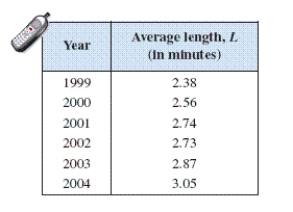 Use the regression feature of a graphing utility to find a linear model for the data. Let t represent the year, with t = 9 corresponding to 1999. Use the model to predict the average lengths of cellular phone calls for the year 2012. Round your answer to two decimal places.
Use the regression feature of a graphing utility to find a linear model for the data. Let t represent the year, with t = 9 corresponding to 1999. Use the model to predict the average lengths of cellular phone calls for the year 2012. Round your answer to two decimal places.
A) 5.00 minutes
B) 8.00 minutes
C) 4.00 minutes
D) 2.00 minutes
E) 3.00 minutes
 Use the regression feature of a graphing utility to find a linear model for the data. Let t represent the year, with t = 9 corresponding to 1999. Use the model to predict the average lengths of cellular phone calls for the year 2012. Round your answer to two decimal places.
Use the regression feature of a graphing utility to find a linear model for the data. Let t represent the year, with t = 9 corresponding to 1999. Use the model to predict the average lengths of cellular phone calls for the year 2012. Round your answer to two decimal places.A) 5.00 minutes
B) 8.00 minutes
C) 4.00 minutes
D) 2.00 minutes
E) 3.00 minutes

Unlock Deck
Unlock for access to all 150 flashcards in this deck.
Unlock Deck
k this deck
36
Hooke's Law states that the force F required to compress or stretch a spring (within its elastic limits) is proportional to the distance d that the spring is compressed or stretched from its original length. That is,  where k is the measure of the stiffness of the spring and is called the spring constant. The table below shows the elongation d in centimeters of a spring when a force of F kilograms is applied.
where k is the measure of the stiffness of the spring and is called the spring constant. The table below shows the elongation d in centimeters of a spring when a force of F kilograms is applied. 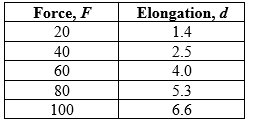
Find the equation of the line that seems to best fit the data. Use the model to estimate the elongation of the spring when a force of 70 kilograms is applied. Round your answer to one decimal place.
A) 2.3 centimeters
B) 4.6 centimeters
C) 6.9 centimeters
D) 9.2 centimeters
E) 3.5 centimeters
 where k is the measure of the stiffness of the spring and is called the spring constant. The table below shows the elongation d in centimeters of a spring when a force of F kilograms is applied.
where k is the measure of the stiffness of the spring and is called the spring constant. The table below shows the elongation d in centimeters of a spring when a force of F kilograms is applied. 
Find the equation of the line that seems to best fit the data. Use the model to estimate the elongation of the spring when a force of 70 kilograms is applied. Round your answer to one decimal place.
A) 2.3 centimeters
B) 4.6 centimeters
C) 6.9 centimeters
D) 9.2 centimeters
E) 3.5 centimeters

Unlock Deck
Unlock for access to all 150 flashcards in this deck.
Unlock Deck
k this deck
37
Simplify  and write the answer in standard form.
and write the answer in standard form.
A)
B) The expression cannot be simplified.
C)
D)
E)
 and write the answer in standard form.
and write the answer in standard form.A)

B) The expression cannot be simplified.
C)

D)

E)


Unlock Deck
Unlock for access to all 150 flashcards in this deck.
Unlock Deck
k this deck
38
Hooke's Law states that the force F required to compress or stretch a spring (within its elastic limits) is proportional to the distance d that the spring is compressed or stretched from its original length. That is,  where k is the measure of the stiffness of the spring and is called the spring constant. The table below shows the elongation d in centimeters of a spring when a force of F kilograms is applied.
where k is the measure of the stiffness of the spring and is called the spring constant. The table below shows the elongation d in centimeters of a spring when a force of F kilograms is applied. 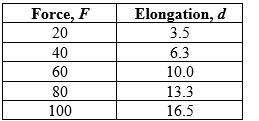
Sketch a scatter plot of the data.
A)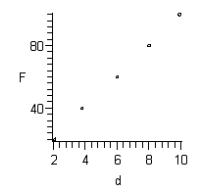
B)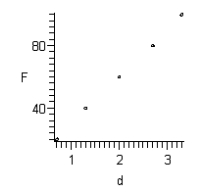
C)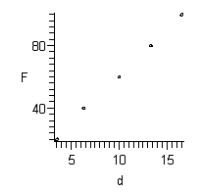
D)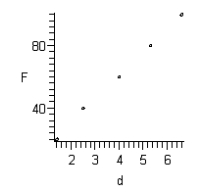
E)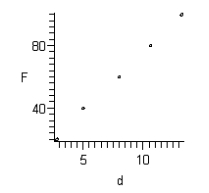
 where k is the measure of the stiffness of the spring and is called the spring constant. The table below shows the elongation d in centimeters of a spring when a force of F kilograms is applied.
where k is the measure of the stiffness of the spring and is called the spring constant. The table below shows the elongation d in centimeters of a spring when a force of F kilograms is applied. 
Sketch a scatter plot of the data.
A)

B)

C)

D)

E)


Unlock Deck
Unlock for access to all 150 flashcards in this deck.
Unlock Deck
k this deck
39
Find all solutions of  .
.
A)
B)
C)
D)
E)
 .
.A)

B)

C)

D)

E)


Unlock Deck
Unlock for access to all 150 flashcards in this deck.
Unlock Deck
k this deck
40
Which of the following is a zero of the given function? 
 ,
,  ,
,  ,
, 
A)
B)
C)
D)
E) none of these

 ,
,  ,
,  ,
, 
A)

B)

C)

D)

E) none of these

Unlock Deck
Unlock for access to all 150 flashcards in this deck.
Unlock Deck
k this deck
41
Solve: 
A)
B)
C)
D)
E)

A)

B)

C)

D)

E)


Unlock Deck
Unlock for access to all 150 flashcards in this deck.
Unlock Deck
k this deck
42
Find all solutions of the following equation algebraically. 
A)
B)
C)
D)
E)

A)

B)

C)

D)

E)


Unlock Deck
Unlock for access to all 150 flashcards in this deck.
Unlock Deck
k this deck
43
Which of the following is a zero of the given function? 
 ,
,  ,
,  ,
, 
A)
B)
C)
D)
E) none of these

 ,
,  ,
,  ,
, 
A)

B)

C)

D)

E) none of these

Unlock Deck
Unlock for access to all 150 flashcards in this deck.
Unlock Deck
k this deck
44
Solve: 
A)
B)
C)
D)
E)

A)

B)

C)

D)

E)


Unlock Deck
Unlock for access to all 150 flashcards in this deck.
Unlock Deck
k this deck
45
Solve: 
A) no solution
B)
C)
D)
E)

A) no solution
B)

C)

D)

E)


Unlock Deck
Unlock for access to all 150 flashcards in this deck.
Unlock Deck
k this deck
46
Hooke's Law states that the force F required to compress or stretch a spring (within its elastic limits) is proportional to the distance d that the spring is compressed or stretched from its original length. That is,  where k is the measure of the stiffness of the spring and is called the spring constant. The table below shows the elongation d in centimeters of a spring when a force of F kilograms is applied.
where k is the measure of the stiffness of the spring and is called the spring constant. The table below shows the elongation d in centimeters of a spring when a force of F kilograms is applied. 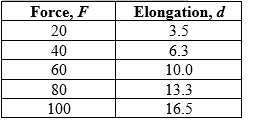
Find the equation of the line that seems to best fit the data. Use the model to estimate the elongation of the spring when a force of 35 kilograms is applied. Round your answer to one decimal place.
A) 2.9 centimeters
B) 8.7 centimeters
C) 4.4 centimeters
D) 5.8 centimeters
E) 11.6 centimeters
 where k is the measure of the stiffness of the spring and is called the spring constant. The table below shows the elongation d in centimeters of a spring when a force of F kilograms is applied.
where k is the measure of the stiffness of the spring and is called the spring constant. The table below shows the elongation d in centimeters of a spring when a force of F kilograms is applied. 
Find the equation of the line that seems to best fit the data. Use the model to estimate the elongation of the spring when a force of 35 kilograms is applied. Round your answer to one decimal place.
A) 2.9 centimeters
B) 8.7 centimeters
C) 4.4 centimeters
D) 5.8 centimeters
E) 11.6 centimeters

Unlock Deck
Unlock for access to all 150 flashcards in this deck.
Unlock Deck
k this deck
47
Simplify  and write the answer in standard form.
and write the answer in standard form.
A)
B) The expression cannot be simplified.
C)
D)
E)
 and write the answer in standard form.
and write the answer in standard form.A)

B) The expression cannot be simplified.
C)

D)

E)


Unlock Deck
Unlock for access to all 150 flashcards in this deck.
Unlock Deck
k this deck
48
Use absolute value notation to define the interval shown below.  -8 0
-8 0
A)
B)
C)
D)
E)
 -8 0
-8 0A)

B)

C)

D)

E)


Unlock Deck
Unlock for access to all 150 flashcards in this deck.
Unlock Deck
k this deck
49
Set  and solve the resulting equation.
and solve the resulting equation. 
A)
B)
C)
D)
E)
 and solve the resulting equation.
and solve the resulting equation. 
A)

B)

C)

D)

E)


Unlock Deck
Unlock for access to all 150 flashcards in this deck.
Unlock Deck
k this deck
50
Solve the inequality  and write the solution set in interval notation.
and write the solution set in interval notation.
A)
B)
C)
D)
E)
 and write the solution set in interval notation.
and write the solution set in interval notation.A)

B)

C)

D)

E)


Unlock Deck
Unlock for access to all 150 flashcards in this deck.
Unlock Deck
k this deck
51
Determine any point(s) of intersection between the following equations. 
A)
B)
C)
D)
E)

A)

B)

C)

D)

E)


Unlock Deck
Unlock for access to all 150 flashcards in this deck.
Unlock Deck
k this deck
52
Find all solutions of the following equation algebraically. 
A)
B)
C)
D)
E)

A)

B)

C)

D)

E)


Unlock Deck
Unlock for access to all 150 flashcards in this deck.
Unlock Deck
k this deck
53
Hooke's Law states that the force F required to compress or stretch a spring (within its elastic limits) is proportional to the distance d that the spring is compressed or stretched from its original length. That is,  where k is the measure of the stiffness of the spring and is called the spring constant. The table below shows the elongation d in centimeters of a spring when a force of F kilograms is applied.
where k is the measure of the stiffness of the spring and is called the spring constant. The table below shows the elongation d in centimeters of a spring when a force of F kilograms is applied. 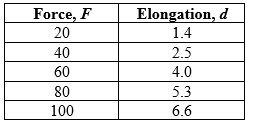
Sketch a scatter plot of the data.
A)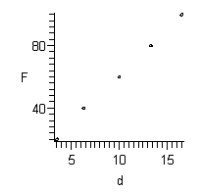
B)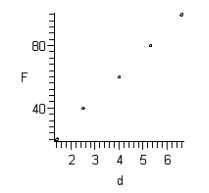
C)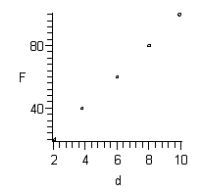
D)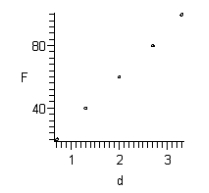
E)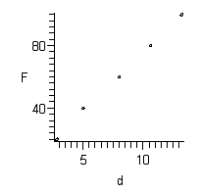
 where k is the measure of the stiffness of the spring and is called the spring constant. The table below shows the elongation d in centimeters of a spring when a force of F kilograms is applied.
where k is the measure of the stiffness of the spring and is called the spring constant. The table below shows the elongation d in centimeters of a spring when a force of F kilograms is applied. 
Sketch a scatter plot of the data.
A)

B)

C)

D)

E)


Unlock Deck
Unlock for access to all 150 flashcards in this deck.
Unlock Deck
k this deck
54
The average lengths L of cellular phone calls in minutes from 1999 to 2004 are shown in the table below. 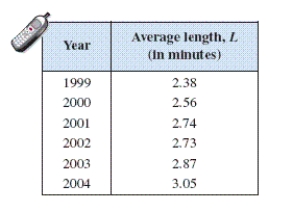 Use the regression feature of a graphing utility to find a linear model for the data. Let t represent the year, with t = 9 corresponding to 1999. Use the model to predict the average lengths of cellular phone calls for the year 2006. Round your answer to two decimal places.
Use the regression feature of a graphing utility to find a linear model for the data. Let t represent the year, with t = 9 corresponding to 1999. Use the model to predict the average lengths of cellular phone calls for the year 2006. Round your answer to two decimal places.
A) 6.54 minutes
B) 1.64 minutes
C) 2.27 minutes
D) 4.27 minutes
E) 3.27 minutes
 Use the regression feature of a graphing utility to find a linear model for the data. Let t represent the year, with t = 9 corresponding to 1999. Use the model to predict the average lengths of cellular phone calls for the year 2006. Round your answer to two decimal places.
Use the regression feature of a graphing utility to find a linear model for the data. Let t represent the year, with t = 9 corresponding to 1999. Use the model to predict the average lengths of cellular phone calls for the year 2006. Round your answer to two decimal places.A) 6.54 minutes
B) 1.64 minutes
C) 2.27 minutes
D) 4.27 minutes
E) 3.27 minutes

Unlock Deck
Unlock for access to all 150 flashcards in this deck.
Unlock Deck
k this deck
55
Solve the following equation. 
A)
B)
C)
D)
E)

A)

B)

C)

D)

E)


Unlock Deck
Unlock for access to all 150 flashcards in this deck.
Unlock Deck
k this deck
56
Find the x-intercepts of the graph of the equation 
A)
B) ,
, 
C)
D) ,
, 
E) ,
, 

A)

B)
 ,
, 
C)

D)
 ,
, 
E)
 ,
, 

Unlock Deck
Unlock for access to all 150 flashcards in this deck.
Unlock Deck
k this deck
57
Simplify  and write the answer in standard form.
and write the answer in standard form.
A) i
i
B) i
i
C) i
i
D) i
i
E) i
i
 and write the answer in standard form.
and write the answer in standard form.A)
 i
iB)
 i
iC)
 i
iD)
 i
iE)
 i
i
Unlock Deck
Unlock for access to all 150 flashcards in this deck.
Unlock Deck
k this deck
58
Simplify  and write the answer in standard form.
and write the answer in standard form.
A)
B)
C)
D)
E)
 and write the answer in standard form.
and write the answer in standard form.A)

B)

C)

D)

E)


Unlock Deck
Unlock for access to all 150 flashcards in this deck.
Unlock Deck
k this deck
59
Solve the following equation. 
A)
B)
C)
D)
E)

A)

B)

C)

D)

E)


Unlock Deck
Unlock for access to all 150 flashcards in this deck.
Unlock Deck
k this deck
60
Which of the following is a zero of the given function? 
 ,
,  '
'  ,
, 
A)
B)
C)
D)
E) none of these

 ,
,  '
'  ,
, 
A)

B)

C)

D)

E) none of these

Unlock Deck
Unlock for access to all 150 flashcards in this deck.
Unlock Deck
k this deck
61
Find all solutions of the following equation algebraically. 
A)
B)
C)
D)
E)

A)

B)

C)

D)

E)


Unlock Deck
Unlock for access to all 150 flashcards in this deck.
Unlock Deck
k this deck
62
Set  and solve the resulting equation.
and solve the resulting equation. 
A)
B)
C)
D)
E)
 and solve the resulting equation.
and solve the resulting equation. 
A)

B)

C)

D)

E)


Unlock Deck
Unlock for access to all 150 flashcards in this deck.
Unlock Deck
k this deck
63
Solve for x: 
A)
B)
C)
D)
E)

A)

B)

C)

D)

E)


Unlock Deck
Unlock for access to all 150 flashcards in this deck.
Unlock Deck
k this deck
64
The average lengths L of cellular phone calls in minutes from 1999 to 2004 are shown in the table below. 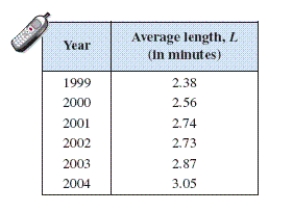 Use the regression feature of a graphing utility to find a linear model for the data. Let t represent the year, with t = 9 corresponding to 1999. Use the model to predict the average lengths of cellular phone calls for the year 2010. Round your answer to two decimal places.
Use the regression feature of a graphing utility to find a linear model for the data. Let t represent the year, with t = 9 corresponding to 1999. Use the model to predict the average lengths of cellular phone calls for the year 2010. Round your answer to two decimal places.
A) 7.52 minutes
B) 2.76 minutes
C) 4.76 minutes
D) 1.88 minutes
E) 3.76 minutes
 Use the regression feature of a graphing utility to find a linear model for the data. Let t represent the year, with t = 9 corresponding to 1999. Use the model to predict the average lengths of cellular phone calls for the year 2010. Round your answer to two decimal places.
Use the regression feature of a graphing utility to find a linear model for the data. Let t represent the year, with t = 9 corresponding to 1999. Use the model to predict the average lengths of cellular phone calls for the year 2010. Round your answer to two decimal places.A) 7.52 minutes
B) 2.76 minutes
C) 4.76 minutes
D) 1.88 minutes
E) 3.76 minutes

Unlock Deck
Unlock for access to all 150 flashcards in this deck.
Unlock Deck
k this deck
65
Find all solutions of the following equation algebraically. 
A)
B)
C)
D)
E)

A)

B)

C)

D)

E)


Unlock Deck
Unlock for access to all 150 flashcards in this deck.
Unlock Deck
k this deck
66
Solve  using the quadratic formula.
using the quadratic formula.
A)
B)
C)
D)
E)
 using the quadratic formula.
using the quadratic formula.A)

B)

C)

D)

E)


Unlock Deck
Unlock for access to all 150 flashcards in this deck.
Unlock Deck
k this deck
67
Hooke's Law states that the force F required to compress or stretch a spring (within its elastic limits) is proportional to the distance d that the spring is compressed or stretched from its original length. That is,  where k is the measure of the stiffness of the spring and is called the spring constant. The table below shows the elongation d in centimeters of a spring when a force of F kilograms is applied.
where k is the measure of the stiffness of the spring and is called the spring constant. The table below shows the elongation d in centimeters of a spring when a force of F kilograms is applied. 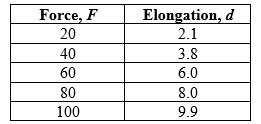
Sketch a scatter plot of the data.
A)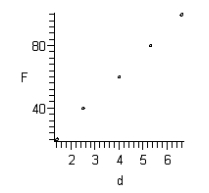
B)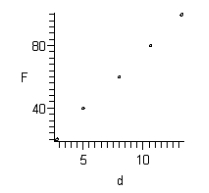
C)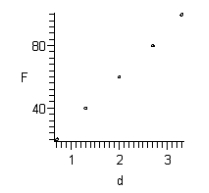
D)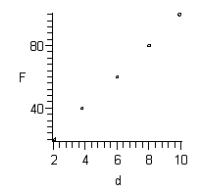
E)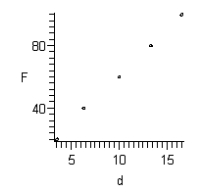
 where k is the measure of the stiffness of the spring and is called the spring constant. The table below shows the elongation d in centimeters of a spring when a force of F kilograms is applied.
where k is the measure of the stiffness of the spring and is called the spring constant. The table below shows the elongation d in centimeters of a spring when a force of F kilograms is applied. 
Sketch a scatter plot of the data.
A)

B)

C)

D)

E)


Unlock Deck
Unlock for access to all 150 flashcards in this deck.
Unlock Deck
k this deck
68
Solve the inequality  and write the solution set in interval notation.
and write the solution set in interval notation.
A)
B)
C)
D)
E)
 and write the solution set in interval notation.
and write the solution set in interval notation.A)

B)

C)

D)

E)


Unlock Deck
Unlock for access to all 150 flashcards in this deck.
Unlock Deck
k this deck
69
Solve the following equation. 
A)
B)
C)
D)
E)

A)

B)

C)

D)

E)


Unlock Deck
Unlock for access to all 150 flashcards in this deck.
Unlock Deck
k this deck
70
Solve  by factoring.
by factoring.
A)
B)
C)
D)
E)
 by factoring.
by factoring.A)

B)

C)

D)

E)


Unlock Deck
Unlock for access to all 150 flashcards in this deck.
Unlock Deck
k this deck
71
Solve: 
A)
B) no solution
C)
D)
E)

A)

B) no solution
C)

D)

E)


Unlock Deck
Unlock for access to all 150 flashcards in this deck.
Unlock Deck
k this deck
72
Use absolute value notation to define the interval shown below.  -7 9
-7 9
A)
B)
C)
D)
E)
 -7 9
-7 9A)

B)

C)

D)

E)


Unlock Deck
Unlock for access to all 150 flashcards in this deck.
Unlock Deck
k this deck
73
Hooke's Law states that the force F required to compress or stretch a spring (within its elastic limits) is proportional to the distance d that the spring is compressed or stretched from its original length. That is,  where k is the measure of the stiffness of the spring and is called the spring constant. The table below shows the elongation d in centimeters of a spring when a force of F kilograms is applied.
where k is the measure of the stiffness of the spring and is called the spring constant. The table below shows the elongation d in centimeters of a spring when a force of F kilograms is applied. 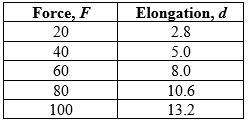
Find the equation of the line that seems to best fit the data. Use the model to estimate the elongation of the spring when a force of 30 kilograms is applied. Round your answer to one decimal place.
A) 6.0 centimeters
B) 4.0 centimeters
C) 8.0 centimeters
D) 3.0 centimeters
E) 2.0 centimeters
 where k is the measure of the stiffness of the spring and is called the spring constant. The table below shows the elongation d in centimeters of a spring when a force of F kilograms is applied.
where k is the measure of the stiffness of the spring and is called the spring constant. The table below shows the elongation d in centimeters of a spring when a force of F kilograms is applied. 
Find the equation of the line that seems to best fit the data. Use the model to estimate the elongation of the spring when a force of 30 kilograms is applied. Round your answer to one decimal place.
A) 6.0 centimeters
B) 4.0 centimeters
C) 8.0 centimeters
D) 3.0 centimeters
E) 2.0 centimeters

Unlock Deck
Unlock for access to all 150 flashcards in this deck.
Unlock Deck
k this deck
74
Solve for x, rounding your answer to the nearest thousandth. 
A) -0.494
B) -0.033
C) 5.491
D) -0.365
E) 6.009

A) -0.494
B) -0.033
C) 5.491
D) -0.365
E) 6.009

Unlock Deck
Unlock for access to all 150 flashcards in this deck.
Unlock Deck
k this deck
75
Solve the following quadratic equation by factoring. 
A)
B)
C)
D)
E)

A)

B)

C)

D)

E)


Unlock Deck
Unlock for access to all 150 flashcards in this deck.
Unlock Deck
k this deck
76
Simplify  and write the answer in standard form.
and write the answer in standard form.
A)
B)
C)
D)
E)
 and write the answer in standard form.
and write the answer in standard form.A)

B)

C)

D)

E)


Unlock Deck
Unlock for access to all 150 flashcards in this deck.
Unlock Deck
k this deck
77
Find the x-intercepts of the graph of the equation 
A)
B) ,
, 
C) ,
, 
D) ,
, 
E)

A)

B)
 ,
, 
C)
 ,
, 
D)
 ,
, 
E)


Unlock Deck
Unlock for access to all 150 flashcards in this deck.
Unlock Deck
k this deck
78
Solve the following equation using any convenient method. 
A)
B)
C)
D)
E)

A)

B)

C)

D)

E)


Unlock Deck
Unlock for access to all 150 flashcards in this deck.
Unlock Deck
k this deck
79
Find all solutions of  .
.
A)
B)
C)
D)
E)
 .
.A)

B)

C)

D)

E)


Unlock Deck
Unlock for access to all 150 flashcards in this deck.
Unlock Deck
k this deck
80
Determine any point(s) of intersection between the following equations. 
A)
B)
C)
D)
E)

A)

B)

C)

D)

E)


Unlock Deck
Unlock for access to all 150 flashcards in this deck.
Unlock Deck
k this deck


